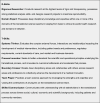Training T-shaped translational scientists
- PMID: 39830612
- PMCID: PMC11736293
- DOI: 10.1017/cts.2024.674
Training T-shaped translational scientists
Abstract
To evaluate the design of I-Corps@NCATS as a translational scientist training program, we mapped specific elements of the program's content and pedagogy to the characteristics of a translational scientist, as first defined by Gilliland et al. []: systems thinker, process innovator, boundary spanner, team player, and skilled communicator. Using a mixed-methods evaluation, we examined how the I-Corps@NCATS training program, delivered across twenty-two Clinical and Translational Science Award Hubs, impacted the development of these key translational scientist characteristics.
Methods: We developed survey items to assess the characteristics of systems thinker, process innovator, boundary spanner, team player, and skilled communicator. Data were collected from a national sample of 281 participants in the I-Corps@NCATS program. Using post-then-retrospective-pre survey items, participants self-reported their ability to perform skills associated with each of the translational scientist characteristics. Additionally, two open-ended survey questions explored how the program shifted participants' translational orientation, generating 211 comments. These comments were coded through a team-based, iterative process.
Results: Respondents reported the greatest increases in self-assessed abilities related to systems thinking and skilled communication. Participants indicated the highest levels of abilities related to team player and boundary crosser. From the coding of open-ended comments, we identified two additional characteristics of translational scientists: intellectual humility and cognitive flexibility.
Conclusions: Participation in I-Corps@NCATS accelerates translational science in two ways: 1) by teaching the process of scientific translation from research ideas to real-world solutions, and 2) by encouraging growth in the mindset and characteristics of a translational scientist.
Keywords: I-Corps; T-shaped scientist; Translational scientist; customer discovery; workforce development.
© The Author(s) 2024.
Conflict of interest statement
The authors declare none.
Figures




References
Grants and funding
LinkOut - more resources
Full Text Sources
